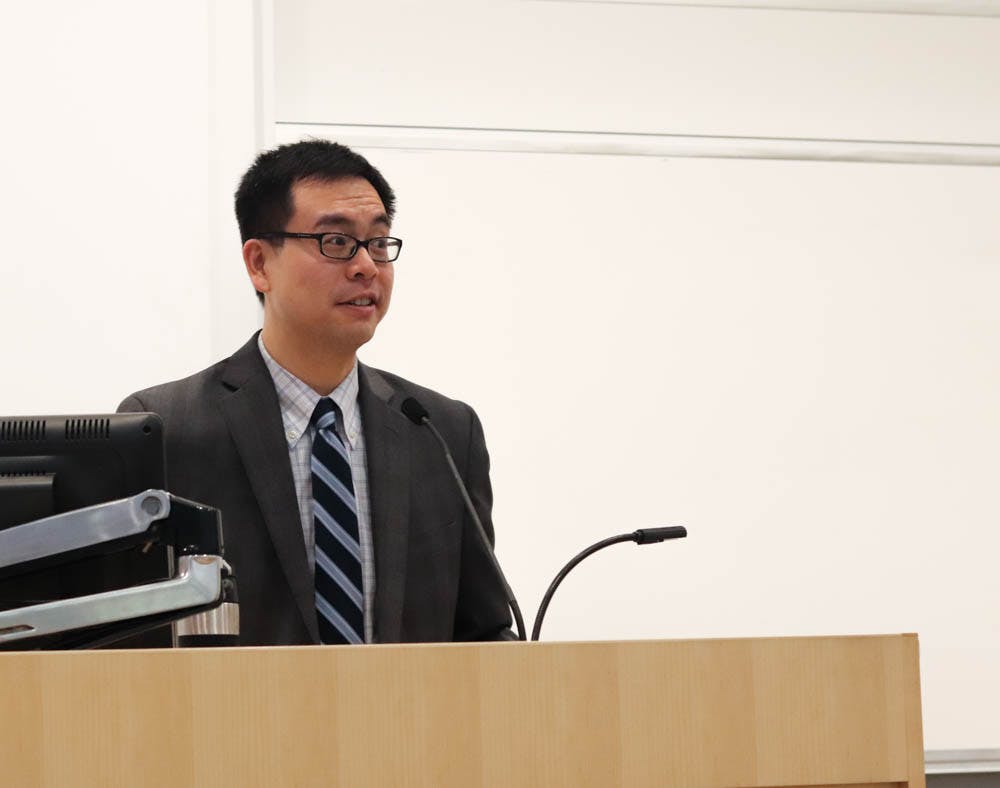In an increasingly digital world, cybersecurity is no longer a “technical issue,” but rather a concern that is “broad ranging,” with implications for a variety of fields, including international security and the global economy, said Vinh Nguyen, the national intelligence officer for cyber issues on the U.S. National Intelligence Council, in a lecture hosted by the computer science department Monday.
“It is something that we all have to be responsible for and we all have to understand,” Nguyen elaborated.
Nguyen’s lecture, entitled “The Growing Risk of Surprise in Cyberspace,” highlighted the increased cybersecurity vulnerability that has accompanied the growing pervasiveness of technology.
“We can see that certain norms that we’ve held … since the World War II victory, that this order that we created, the institutions that we built, (are) eroding by the day” due to the rise of technology and the lack of sufficient cybersecurity precautions, Nguyen said.
Frequently, companies sacrifice security in order to be economically competitive, Nguyen added.
“I would argue that the drive for global competition, that we all want to grow and to be prosperous and competitive, (comes) at a cost of security that we pay in the long-run, and that is not something that we are thinking about,” he said.
Combating cyber threats requires thinking beyond traditional responses to adversaries, he advised. “In the military when you have an opponent, … you neutralize them,” Nguyen said. “But in cybersecurity if you try to neutralize and mitigate your adversary, you actually just gave your adversary a lesson to learn how to evade you and how they can recover and operate against you later on. So you actually teach them resilience.”
To operate under these conditions, Nguyen advised innovative approaches and determination.
“We’re advising people to be more resilient — we advise people to really think about the complexity of the system,” he said. “We have to approach it that way rather than using traditional tools to fight a threat.”
Individuals can take certain steps to protect their data in the face of heightened risks, Nguyen told The Herald.
“The most important recommendation I would ever give is two-factor authentication,” Nguyen said. “It is a pain in the neck, but it is something that is (also) a pain in the neck for your adversaries.”
Students enrolled in CSCI 1800: “Cybersecurity and International Relations” attended the lecture. Professor of Computer Science John Savage, who teaches the course, introduced Nguyen.
Josh Levin ’20, who took CSCI 1800 last year and is a teaching assistant for the course this year, said he appreciated hearing Nguyen’s take on some possible solutions to cybersecurity threats.
“These types of talks have an inherent pessimism because it’s about how to combat problems and such, and I think it’s interesting to hear how he approaches that pessimism and how he thinks” the United States and concerned citizens “can get over that hump,” Levin said.
Daniel de Castro ’20, a double concentrator in computer science and political science, said the talk was relevant to both his fields of study.
“It was interesting to see how policy is going to have to play a role in the future of internet governance and technology in general,” de Castro said.
Ultimately, Nguyen stressed the power of each person to positively affect cybersecurity.
“We can all take little actions to make it better,” he said. “You don’t have to be a cybersecurity professional to do cybersecurity. You can do it by yourself every day.”





